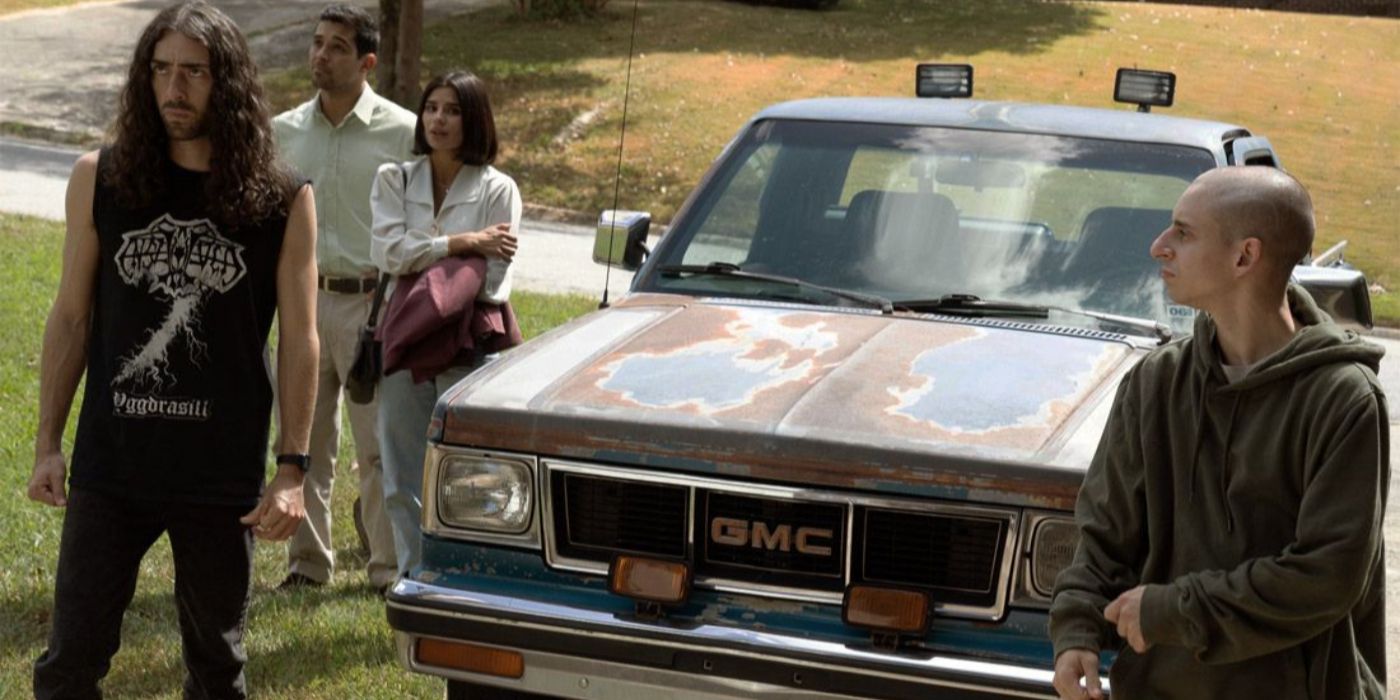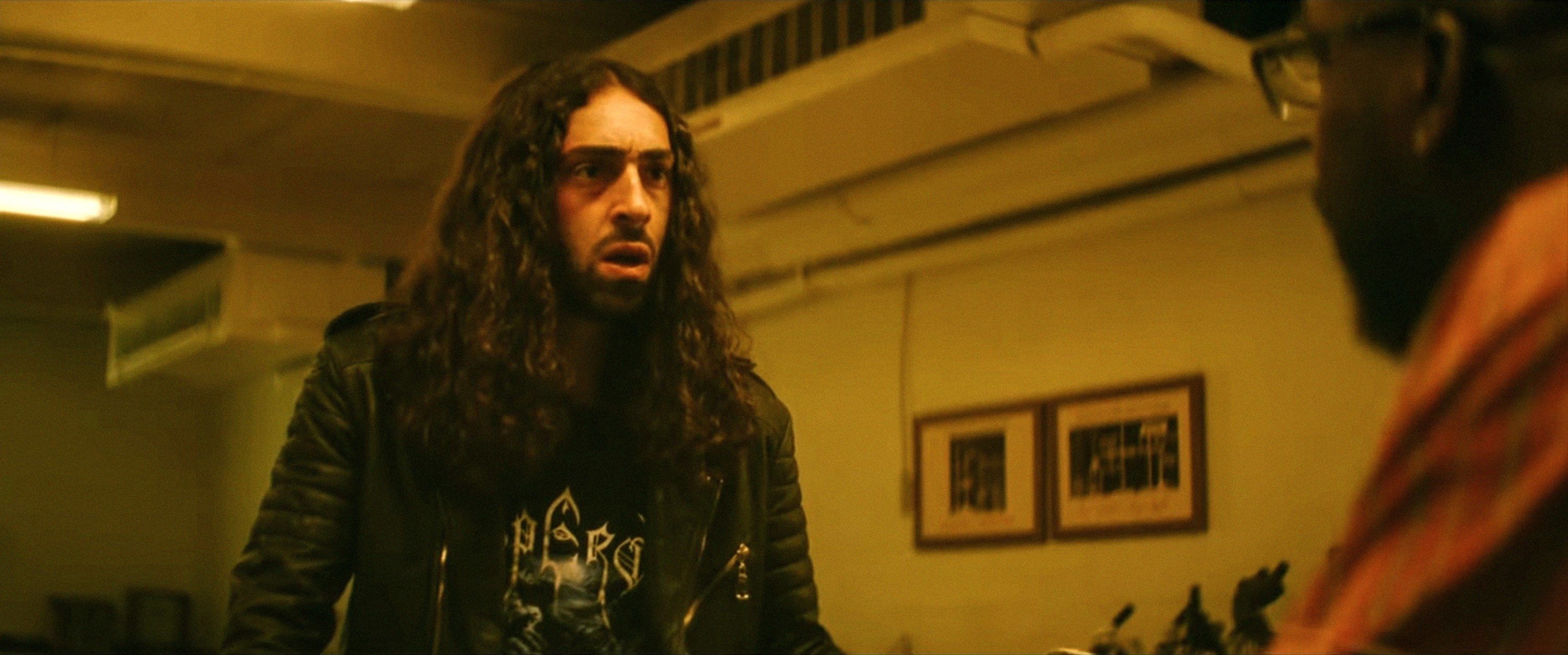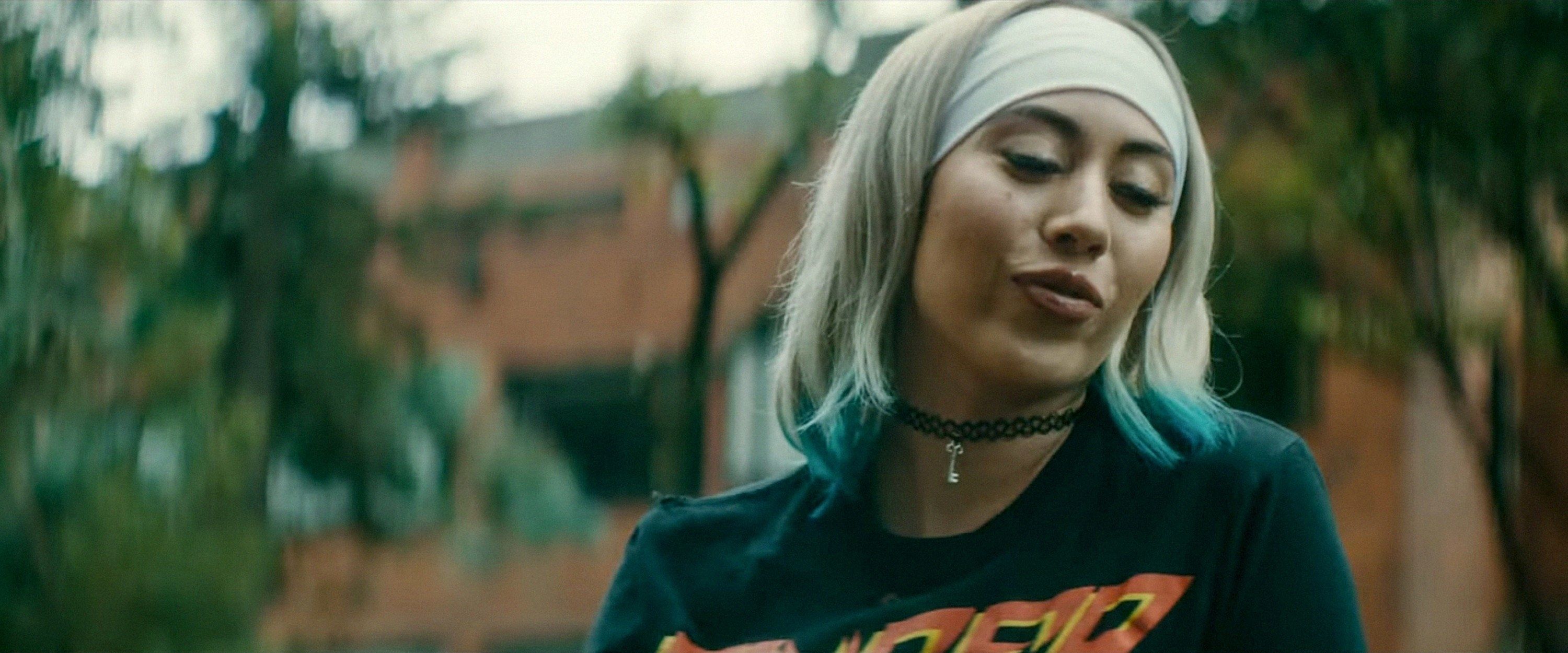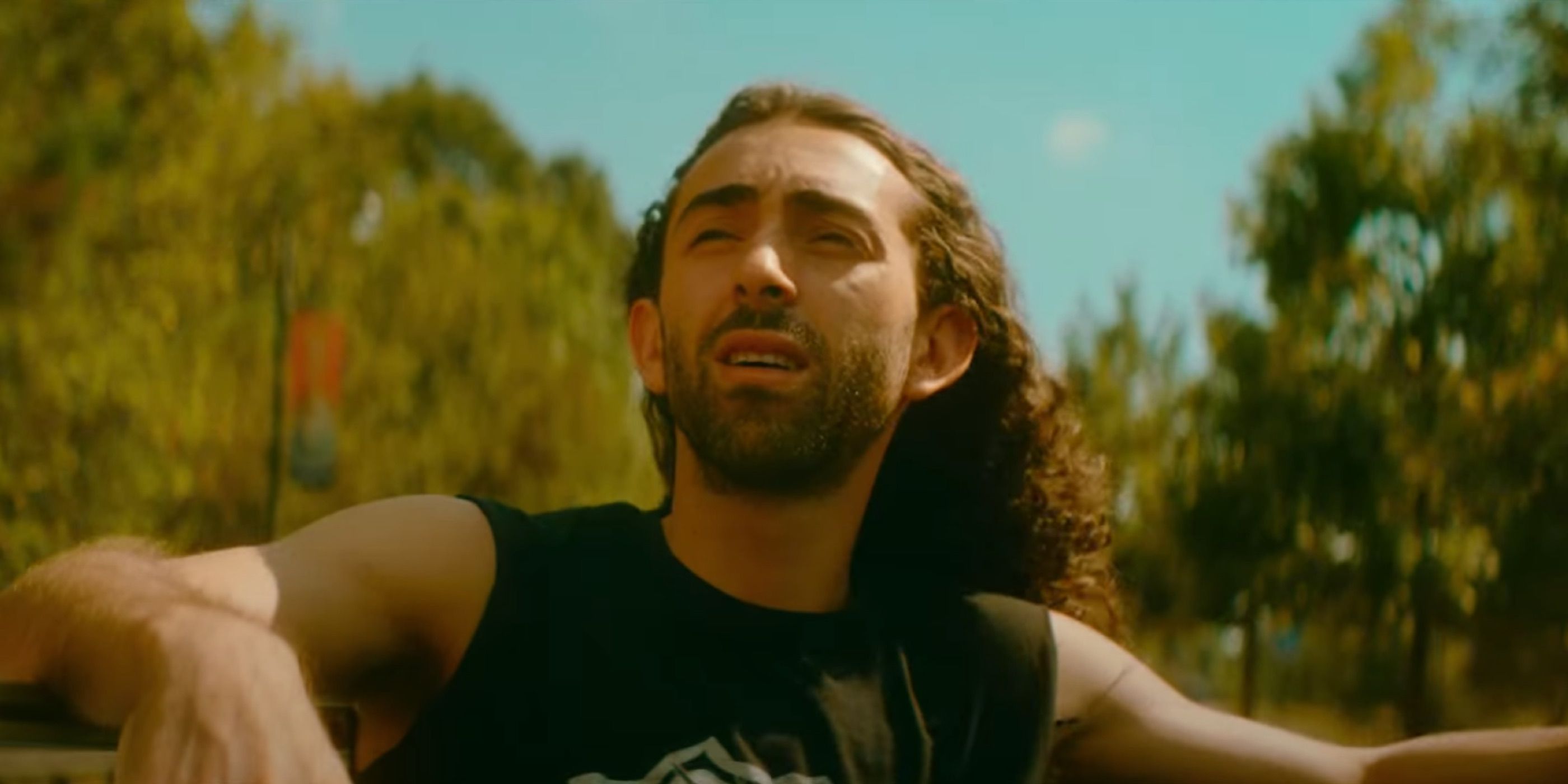Blast Beat is a film that takes a very familiar premise — the coming to America story — and shows us a side of it we haven't seen before: the Colombian American experience. Rather than focus on the struggles and dangers of leaving Colombia, the film gives us a very specific story about a family looking for a better home, only to find more hardships, which ends up being uniquely universal.
[Editor's note: The following contains spoilers for Blast Beat.]
Directed by Esteban Arango from a script he co-wrote with Erick Castrillon, Blast Beat is based on a short story of the same name they made back in 2015. The film focuses on two brothers, the artistically-minded and rap-enthusiast Mateo (Moisés Arias) and metalhead Carly (Mateo Arias). Fleeing extortion in Bogota, Colombia at the tail-end of the '90s, the boys and their mother Nelly (Diane Guerrero) arrive in Atlanta to meet their father, played by Wilmer Valderrama. From the moment we meet the two brothers, Blast Beat makes it clear that it is not interested in following the same or a rags to riches success story we've seen in other stories about immigrants, or focus on the unfortunate stereotypes that Hollywood often relies on when portraying Colombians on screen.
There is no mention of drugs or gangs, but there is a palpable fear of being drafted into the "Lanceros" (an elite anti-guerrilla military group) and getting killed in the jungle. Rather, Carly is ecstatic about moving to the U.S. because he knows that's the only place where he can follow his dreams of working at NASA, even if his metalhead look dies what other people's expectations for how he should act.
That defiance of expectations of how Colombians should look and act in a film is a big part of why Arango wanted to tell this story in the first place. Having grown up loving American movies, he and Castrillon felt like they weren't getting the stories they themselves were experiencing. "I think about bringing an authentic, truthful lens into these types of stories, because when movies feel like they've been painted with a broad brush," Arango told Collider. "It doesn't feel like it comes from an honest place. It always feels like it's watered down in some way. For me, universality comes from being hyperspecific because that's what feels real."
In order to create a sense of authenticity, Castrillon made sure to imbue the script with real experiences, whether from his or Arango's life or from friends, family, or acquaintances. "I can point at every single word in the script and then trace back where that inspiration came from," Castrillon added. "My mom did this, or Esteban's brother said that. I think that's why it shines with an organic legitimacy because we had that as a goal. It needed to feel legitimate to our friends and our family."
Indeed, that authenticity, and most importantly, the specificity of the story being told is what makes Blast Beat so special, as it infuses every aspect of the story and the film. In the past few years, we've seen Hollywood try to do big movies catering to an underrepresented audience, like Crazy Rich Asians and Raya and the Last Dragon, which borrow from several cultures without really stepping too deeply into any one specific country or culture, resulting in films that feel superficial in their representation. When it comes to stories about immigration, especially Latinx stories, there's a tendency of grouping together all Latin American countries and only vaguely allude to where the characters are from. Not in Blast Beat, which gives Mateo and Carly a specific and rich texture in the way they talk, handily and casually dropping words like "cucho," "parce," and "paila" whenever they're talking Spanish, and also becomes one of the few movies willing to make "perreo" part of its plot.
"The movie shines a light on a different sort of story than the stereotype that Colombia has had since the '80s, and this shows the variety of Latin America," Moisés Arias explains. "Our Spanish is de la casa, literally from home, so being able to use that specific language and accent that we've always heard from home hits differently." Despite speaking Spanish for a big portion of the film, Carly and Mateo also speak English fluently, making this one of the rare movies about Latinx immigrants that don't focus on ESL struggles.
"My brother and I speak to each other dominantly in English, and use Spanish for when we want to say something directly to each other, but the film is the other way around." Mateo Arias adds. "They speak to each other only in Spanish, and Carly tries to speak to Mateo in English and Mateo gets mad. That dynamic was a bit difficult to get into as it was far removed from how we are, but it added another layer to the movie that made the story feel specific and unique."
That authenticity and rawness don't stop with the part of the story that is set in Colombia, but only gets better when the family gets reunited in America. Blast Beat is not only a good Colombian story, but a great American story, as it serves as poignant commentary on the American Dream and the difficulties of assimilating in a strange place that isn't very welcoming to outsiders. The moment the family arrives in Atlanta and the father picks them up, Arango's camera and Castrillon's script make sure that you feel the palpable emotional canyon that now separates the family even if they don't want to admit it. The time they spent separated took a huge toll on them, which Arango displays slowly until it comes to a boil, perfectly capturing the emotional distance that challenges many immigrant families where one parent emigrates ahead of the rest, and never manages to repair that separation.
"There is a little bit of shame in [the father character] as they get home and realize that what he told them and what they expected isn't necessarily what they are finding," Valderrama told Collider. "You meet a man who's been working really hard to afford this moment of the family finally reuniting. We had a lot of conversations about what was left unsaid, like how long they'd been apart, how much the kids had changed, how much influence does the father have in the kids how that they are in a new terrain? I've never played my dad, I was creating him, and that was pretty... That was pretty something."
Indeed, the most powerful moments of the film come out of that clash of expectations. In an early Colombia-set scene, Nelly tells some friends and family about how wonderful their Atlanta house is and about the great things her husband has said about America, so her reaction the moment she realizes things are not perfect, and seeing her make excuses like "at least the neighborhood is quiet and safe" is a gut-punch. Things don't stop at home, however. At school, Mateo and Carly continuously face xenophobia and racism, from being asked where in Mexico is Colombia, to a professor shutting Carly down for not doing a bunch of extra steps in his homework because "that's not how we do things here."
Many coming-to-America movies center on the hard work required to make it in the U.S. and how worthy it is. Blast Beat does portray some of it, but it is also unafraid of showing that it is not the end-all, be-all of fulfillment. Throughout the film, Mateo is complaining about how they truly were better off in Colombia, how much better their life was. In many ways, Blast Beat shares a thematic connection with the adaptation of In the Heights, a film that also interrogates the cost of the American Dream through the eyes of Latinx immigrants.
"We don't talk that much about that," Arango said referring to the struggle of making it in the U.S. as an immigrant. "We have seen people who fought for their dream and made it, but there is the other side of it which is very important. Because we came here very young, we saw in our community of friends and family that not everyone got to stay here. And in our young minds, we saw that as a defeat somehow. Going back to where you came from was like you couldn't make it, you're not cut out for this. It was important for us to say with the movie that the American Dream is real, but it is not the only way, you can also go back and do much better than those who stayed too."
"The American dream is not all-encompassing," Castrillon added. "You can pursue not only your passion, but your impetus, where your heart leads you, and that is also valid. That's as valid as chasing a larger-than-life dream."
This is why it's so special and effective that the cast of Blast Beast not only has roots in Colombia, but they are U.S.-born Latinos as well. From Valderrama to the Arias brothers, to Guerrero — who has been outspoken about her parents' deportation and the impact it's had on her life —, the cast is able to pour their own (or their parents') experiences into their characters in a way other actors simply couldn't replicate.
Blast Beat doesn't revolutionize the immigrant story, but it shows how valid and important it is to tell these stories just from a different angle, with different people at the helm. The film is messy, but so is immigration, and this film manages to look at both its homes with a loving but critical eye that isn't afraid to show both the bad and the good.
Blast Beat is now playing in select theaters and is available on demand.




